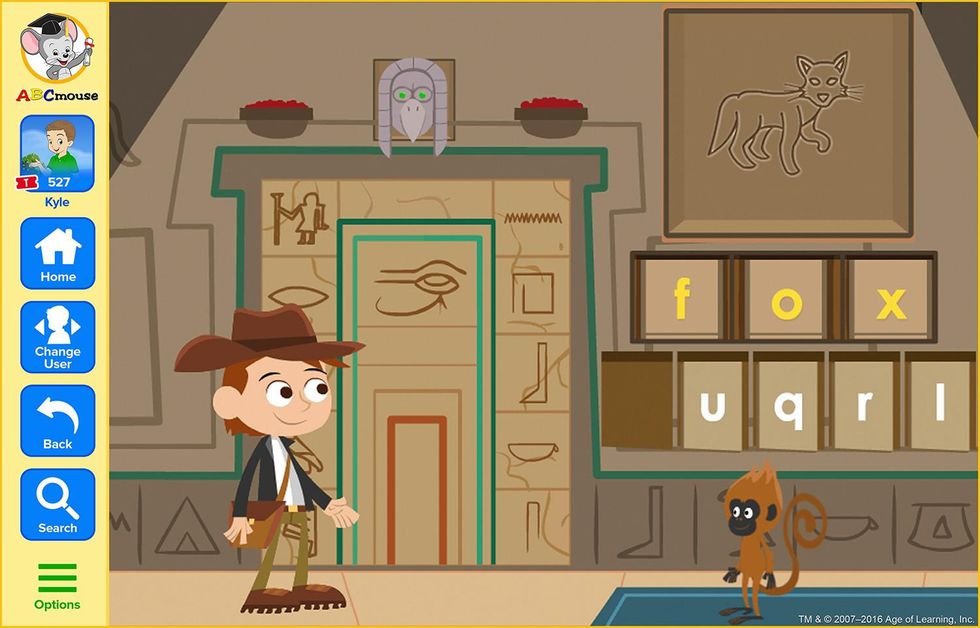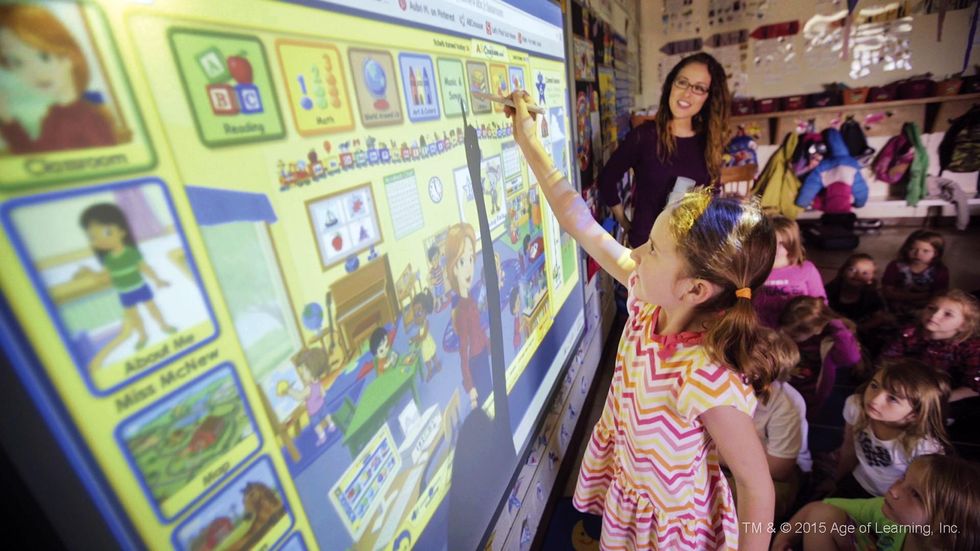The pandemic has prompted the adoption of educational technology, contributing to a red-hot edtech market and reshaping how children are learning.
Last year alone, investors sunk $2.2 billion into edtech companies, according to EdSurge. And data from PitchBook show the first half of this year has already surpassed that, reaching $3.6 billion
ABCmouse, one of the most popular children's learning apps, watched in June as its Glendale-based parent company pulled off the largest financing round ever for an edtech company: $300 million.
Alongside it, a raft of children's educational apps — from Khan Academy Kids to Newsela — promise to improve children's academic skills. Duolingo, a popular language learning app, went public in July. On its first day of trading, shares closed up 36%, valuing the company at nearly $5 billion. But there remain questions about whether all the screen time is effective and educational.
Tony Wan, head of investor content at San Francisco-based venture capital firm Reach Capital, said many investors who have been trepidatious of investments in edtech in the past have witnessed the explosion in the adoption of edtech tools at home and in classrooms, attracting larger private equity firms and more prominent venture capitalists.
"I think the experience [during the pandemic] has really opened up their eyes, followed by their wallets, in terms of the potential that education technology has and how broadly some of these services span across geographies and across age ranges," Wan said.
Educational Experience or Sanctioned Screen Time?
Age of Learning, the 14-year-old company represented by an iconic little grey mouse, was valued at $3 billion after it clinched a financing round backed by TPG, along with Qatar Investment Authority and Madrone Capital Partners. It's one of the largest U.S. edtech companies of its kind.
The company was founded in 2007 by Doug Dohring, who created and sold NeoPets in 2005, a company that allowed users to own virtual pets and buy virtual items for them using virtual money.
Dohring, who declined to talk, has said he wanted to create educational software to address the millions of students who are below grade level standards in reading and math, not one trying to sell products to kids. (NeoPets was criticized for the prevalence of ads on its website).
ABCmouse promises to get anxious parents' kindergarteners reading and their older children up to speed just by "playing" educational games.
And while Age of Learning has funded several studies to evaluate whether their products work, many academics say third-party research is needed to determine the effectiveness of such edtech apps, although effectiveness is difficult to measure.
"It's hard to say if it's truly, truly helping improve student learning, but I do think if it's helping students engage and practice skills and getting them excited to want to learn, then to me, that's successful," said Tim Green, a professor of educational technology at California State University Fullerton.
But there is not a great amount of specific research on these tools, especially studies that have been replicated, Green said. One classroom with a specific teacher and a specific group of kids does not represent all classrooms.
"If I'm having students spend an hour to two hours using ABCmouse, I want to be able to see some gains specifically," Green said. "I think it's difficult to do with a lot of software because those kinds of studies are not the easiest to set up, so I'm not sure that's always possible."
In the absence of research, educators must evaluate whether children are actively engaged in the content or view it as just a game.
"We have to look at what are they doing on the device," said Sophia Mendoza, director of the L.A. Unified School District's Instructional Technology Initiative. She added that the implementation of these programs in classrooms must be "strategic and purposeful."
Teachers who leaned on technology during the pandemic have grown accustomed to it. And with the edtech market continuing to boom, academics said it's also important for investors to be concerned about whether the companies they back are educational.
"If you're saying you're going to improve a students' ability to do math skills. It is important to see that there's some evidence with that — and that can be difficult to measure," Green said. "Should investors be concerned about that? Of course."
But Doug Lynch, a faculty member at USC's Rossier School of Education, isn't convinced it's possible for investors to do true due diligence when it comes to edtech.
"Now everybody is, for better or worse, interested in edtech, so there's a lot of money coming in," he said. "They're very smart investors, but they don't know a lot about the market and what the science tells us about learning."
Compounding the problem is the lack of a regulatory body overseeing edtech, giving it less scrutiny than other industries.
"We don't follow the same rigor that we do in education the way we do in healthcare, for example," he said.
A good gauge could be whether school districts purchase the software, but some startup companies do not make it, Lynch said.
COVID Was the Catalyst
Age of Learning has "made it" by many measures.
Its programs have been accessed by 50 million children globally and have been used in hundreds of thousands of classrooms, according to the company.
"It never loses track of your child's progress. All you have to do is play," the company says in a promotional video touting the $12.99 monthly subscription service.
Children can navigate through the app's yellow classroom into more than 850 lessons that can take the shape of a zoo or a farm and include 10,000 activities that range from reading and math to puzzles, games and painting.
The digital lessons seem like a total win for overextended parents, many who struggle to steer their child away from idle screen time in a world where everything is done online.
"Our work is to build quality, engaging, effective digital learning programs that help kids develop a love of learning and in doing so, build core skills that help them in school and beyond," said Zachary Katz, an executive at the Age of Learning who leads legal, corporate and business affairs.
With products aimed at kids 2 to 8 years old, Katz said kids typically spend 45 minutes on the app per week.
"You're not talking about a very heavy load of screen time," he said.
The company's latest infusion of capital will help it expand internationally and invest in a patented system to determine a child's skill level.
It comes as the company must also repay customers $10 million over illegal marketing and billing practices, after regulators found last year the Age of Learning automatically renewed tens of thousands of customer subscriptions, charging them without their consent. The Federal Trade Commission also found the edtech company made it difficult for customers to cancel memberships, earning the company even more fines.
Even as children are returning to classrooms, Katz said Age of Learning expects to keep growing. It's subscriber base remains at pre-COVID-19 levels.
"The gains that we've seen in children using our products have sustained even as kids have gone back to school," Katz said.
After so many years of investors often ignoring the industry, the attention is welcome to companies like Age of Learning.
"We know a fair amount about what could work," Lynch said. "We don't have all the necessary components of an ecosystem yet, maybe COVID will be the catalyst that we needed."



